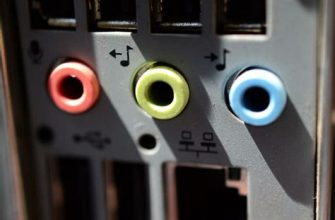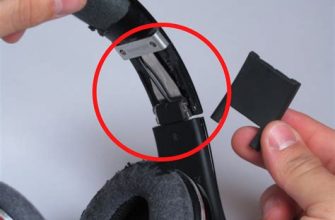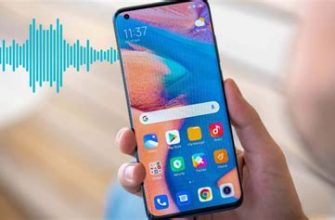In the digital age, where technology has become an integral part of our daily lives, it is disheartening to encounter a situation where our portable device is unable to acknowledge the presence of wired audio peripherals. Whether you rely on your handy laptop for work or leisure activities, it can be frustrating when you are unable to enjoy your favorite music, watch movies, or have clear communication through headphones.
This article aims to provide you with valuable insights and practical solutions to address the dilemma you might encounter when your portable computer fails to detect your wired sound accessories. We will explore various troubleshooting steps to understand the underlying reasons and offer feasible options to resolve the issue, ensuring an uninterrupted audio experience.
Within this article, we will delve into the possible causes behind this perplexing problem and explain step-by-step instructions to troubleshoot the issue. By following our comprehensive guide, you will be equipped with the necessary knowledge to tackle this situation like a pro. So, if you are ready to uncover the secrets to regain the functionality of your beloved wired headphones with your laptop, let us dive into the realm of troubleshooting and find the solution that best suits your needs.
Solutions for When Your Laptop Fails to Recognize Wired Headphones
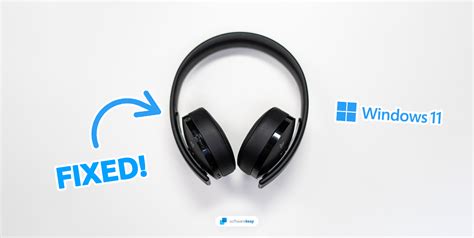
When your laptop fails to recognize the wired headphones connected to it, it can be quite frustrating. However, there are a few solutions you can try to resolve this issue.
One possible solution is to check the headphone jack for any debris or dirt that may be blocking the connection. Gently clean the jack using a soft cloth or a cotton swab, ensuring that there is no residue left behind.
If cleaning the headphone jack does not solve the problem, you can try troubleshooting the audio settings on your laptop. Go to the sound settings and ensure that the headphones are selected as the default audio output device. You may also need to update the audio drivers on your laptop.
Another option is to test the headphones on a different device to see if they work properly. If they do, then the issue is likely with your laptop. In this case, you can try restarting your laptop or performing a system update to see if it resolves the problem.
In some cases, the issue may be related to a hardware problem. If none of the above solutions work, you might need to consider taking your laptop to a professional technician for further diagnosis and repair.
Remember to always check the compatibility of your headphones with your laptop and ensure that they are correctly connected to the headphone jack.
Check the Physical Connections
Ensuring that your laptop is properly connected to your headphones is a crucial step in troubleshooting connection issues. By verifying the physical connections between your laptop and headphones, you can identify any possible faults or problems that may be preventing your headphones from being detected.
Start by examining the audio jack on your laptop and the plug on your headphones. Ensure that both are clean and free from any dirt or debris that may obstruct the connection. Gently insert the headphone plug into the audio jack, making sure it is securely inserted. If your laptop has a separate audio jack for headphones and a microphone, ensure that the plug is inserted into the correct jack.
If possible, try using your headphones with another device to see if they work properly. This can help determine whether the issue lies with your headphones or with your laptop. If your headphones work fine on another device, then the problem likely lies with your laptop's audio settings or drivers.
Additionally, check the cable of your headphones for any signs of damage or fraying. A damaged cable can disrupt the audio signal and may prevent your headphones from being detected. If you notice any damage, consider replacing the cable or contacting the manufacturer for support.
In some cases, your laptop may have multiple audio output options, such as built-in speakers or external speakers. Ensure that the correct audio output is selected in your laptop's audio settings. Changing the audio output can sometimes resolve connection issues and allow your laptop to detect your wired headphones.
By carefully checking the physical connections between your laptop and headphones, you can troubleshoot and resolve any issues that are preventing your headphones from being detected. This simple step can often help restore the functionality of your wired headphones and allow you to enjoy your audio experience without any interruptions.
Restart Your Device
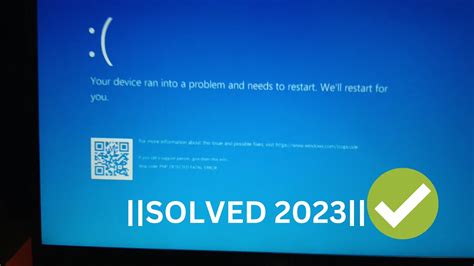
If your laptop is unable to recognize your connected headphones, one of the first troubleshooting steps you should consider is restarting your device. Restarting your device can help resolve various software-related issues that may be causing the problem. This simple step can refresh your device's settings and potentially fix any temporary glitches that may have occurred.
- Save any unsaved work and close all open applications.
- Click on the "Start" button in the bottom left corner of your screen.
- Select the "Restart" option from the menu.
- Wait for your laptop to shut down and then turn back on.
- Once your laptop has restarted, check if it can now detect your wired headphones.
If the issue persists after restarting your laptop, try some of the other troubleshooting methods outlined in this article to further troubleshoot the problem.
Update Audio Drivers
Keeping your laptop's audio drivers up to date is crucial for ensuring proper functionality and compatibility with various audio devices, including wired headphones. This section will guide you through the process of updating your audio drivers to help resolve the issue of your laptop not detecting your wired headphones.
Try a Different Audio Jack
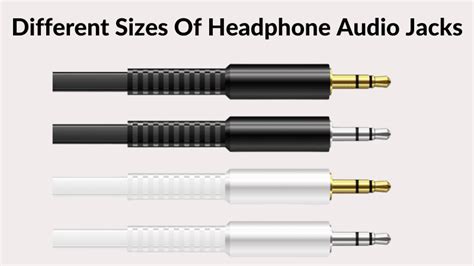
One troubleshooting step you can take when experiencing issues with your laptop's headphone detection is to try using a different audio jack.
Audio jacks, also known as headphone jacks or audio ports, are the physical connectors on your laptop that allow you to connect wired headphones or external speakers. Sometimes, the issue may not lie with your headphones themselves, but rather with the audio jack that you are using.
To try a different audio jack, locate all the available audio ports on your laptop. These can usually be found on the sides or front of the device. Once you have identified a different audio jack, unplug your headphones from the current jack, and plug them into the different one.
After plugging your headphones into the new audio jack, test if they are detected by your laptop. If your headphones are now being recognized, the issue may have been with the previous audio jack that you were using.
If your headphones are still not being detected after trying a different audio jack, it's possible that there may be another underlying issue causing the problem. In such cases, it may be beneficial to try other troubleshooting steps or seek professional assistance to resolve the issue.
Run the Audio Troubleshooter
If you're experiencing difficulties with your laptop recognizing wired headphones, running the audio troubleshooter can help diagnose and resolve the issue. This built-in tool is designed to detect and fix common audio problems, providing a convenient solution for headset detection issues.
Here's how you can run the audio troubleshooter:
1. Access the Control Panel Go to the Control Panel on your laptop by clicking on the Start button and searching for "Control Panel" in the search bar. Alternatively, you can access it by pressing the Windows key + X and selecting Control Panel from the menu. |
2. Navigate to the Troubleshooting section Once in the Control Panel, locate the "Troubleshooting" option. It may be listed under the "System and Security" category. Click on it to proceed. |
3. Run the Audio troubleshooter Within the Troubleshooting section, find the "Hardware and Sound" category and select it. Look for the "Playing Audio" option, which should be available under the "Sound" subsection. Click on it to launch the audio troubleshooter. |
4. Follow the troubleshooter's instructions Once the audio troubleshooter is running, it will automatically scan for any audio-related issues on your laptop. Follow the on-screen instructions provided by the troubleshooter to complete the diagnostic and repair process. |
5. Test the headphones After the troubleshooter completes its analysis and repairs (if any), test your wired headphones by connecting them to your laptop. If the issue persists, you may need to explore other troubleshooting methods or seek further assistance. |
Running the audio troubleshooter is a straightforward and effective step to take when your laptop encounters difficulties in recognizing wired headphones. It can help identify and resolve audio-related problems, allowing you to seamlessly enjoy your audio experience.
Disable Audio Enhancements
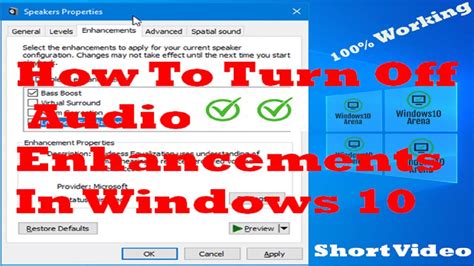
Enhancing the audio on your laptop can sometimes lead to compatibility issues with wired headphones. In such cases, disabling audio enhancements can be a potential solution to the problem.
- Open the Sound settings on your laptop.
- Navigate to the "Playback" tab.
- Locate your headphones from the list of audio devices.
- Right-click on your headphones and select "Properties".
- In the headphones properties window, click on the "Enhancements" tab.
- Uncheck the box next to "Enable audio enhancements".
- Click "Apply" and then "OK" to save the changes.
Disabling audio enhancements can help to resolve any compatibility issues between your laptop and wired headphones. By following the steps above and unchecking the box for "Enable audio enhancements", you will effectively disable any additional audio processing that might interfere with the proper functioning of your headphones.
- If you are using Windows operating system, disabling audio enhancements can be done through the Sound settings.
- Keep in mind that the specific steps may vary depending on the version of Windows you are using.
- By disabling audio enhancements, you are allowing the raw audio signal to pass through to your headphones without any additional modifications or effects.
- This can help to improve the compatibility and overall audio experience when using wired headphones with your laptop.
If your laptop is still unable to detect your wired headphones after disabling audio enhancements, there may be other underlying issues that need to be addressed. In such cases, it is recommended to seek further assistance or consider using alternative headphones.
Check the Sound Settings
When facing issues with your laptop's ability to recognize your plugged-in headphones, it is important to examine and adjust your computer's sound settings. By carefully reviewing the audio configuration, you can ensure that all the necessary settings are properly configured and enable the system to detect your wired headphones effectively.
| Step | Instructions |
|---|---|
| 1 | Open the sound settings menu. This can typically be found in the control panel or system preferences, depending on your operating system. |
| 2 | Check the default audio playback device. Verify that the correct audio output is selected so that the sound can be routed through the headphone jack. |
| 3 | Ensure the headphone option is enabled. If the option is disabled or not visible, you may need to update your audio drivers or install the necessary software. |
| 4 | Adjust the volume levels. Make sure the volume for both the system and headphone output is set appropriately to avoid any potential audio issues. |
| 5 | Try different headphone ports. If your laptop has multiple audio jacks, test each one to determine if the issue is specific to a particular port. |
| 6 | Restart your laptop. Sometimes, a simple restart can resolve any temporary software glitches that may be affecting the headphone detection. |
| 7 | Update audio drivers. Visit the manufacturer's website or use a reliable driver updating tool to ensure you have the latest drivers installed for your sound card. |
By following these steps and thoroughly checking the sound settings on your laptop, you can troubleshoot and resolve issues related to the detection of wired headphones. Remember to test your headphones on other devices to rule out any hardware malfunctions before solely focusing on the laptop settings.
Scan for Malware or Viruses
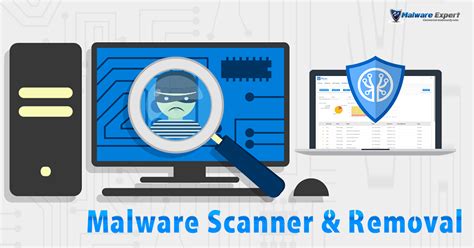
Protecting your laptop from potential threats is essential for optimal performance and functionality. In order to address any issues related to the detection of wired headphones, it is important to consider the possibility of malware or viruses affecting your laptop's system.
Malware or viruses can disrupt the normal operation of your laptop, including the recognition of external devices such as wired headphones. These malicious programs can infiltrate your system through various means, such as downloading infected files or visiting unsafe websites. Once inside your laptop, they can impede the proper functioning of hardware components, potentially causing issues with device detection.
To ensure that your laptop is not affected by malware or viruses, it is recommended to regularly scan your system using reliable antivirus software. This software can detect and remove any malicious programs that may be causing disruptions. It is important to keep your antivirus software up to date to tackle the latest threats efficiently.
During the scanning process, the antivirus software will examine all files and system areas, searching for any signs of malware or viruses. If any threats are detected, the software will prompt you to take appropriate actions, such as quarantining or deleting the infected files. By eliminating malware or viruses, you can minimize the chances of experiencing issues with wired headphone detection on your laptop.
Additionally, it is advisable to exercise caution while downloading files or visiting websites, especially from untrusted sources. Avoid clicking on suspicious links or opening attachments from unknown senders, as these can be potential vectors for malware or viruses.
In conclusion, conducting regular scans for malware or viruses is an important step in troubleshooting wired headphone detection issues on your laptop. By keeping your system clean and secure, you can ensure optimal functionality and enhance your overall experience with your laptop's audio capabilities.
Perform a System Restore
If you are experiencing difficulties with your laptop's ability to recognize wired headphones, one potential solution to consider is performing a system restore. This process enables you to bring your laptop back to a previous state, eliminating any recent changes or updates that might be causing the issue.
To initiate a system restore, navigate to the Control Panel and access the System and Security settings. Look for the "System" option and select it. Within the system settings, choose "System Protection" and then click on the "System Restore" button.
Next, you will be presented with a list of restore points, which are previous operating system configurations saved on your laptop. Review the available options and select a restore point that predates the problem with detecting wired headphones. It's recommended to choose a restore point that aligns with a time when the headphones were working properly.
Once you've chosen a restore point, carefully follow the on-screen prompts to complete the system restore process. Keep in mind that this procedure may take some time, as your laptop will need to reboot and apply the selected configuration. It's important to note that performing a system restore will not affect your personal files, although any software or system updates installed after the selected restore point will be removed.
After the system restore is complete, test your laptop's ability to detect wired headphones again. If the issue persists, it may be necessary to explore alternate solutions such as updating audio drivers or seeking professional assistance.
Contact Technical Support or a Professional Technician
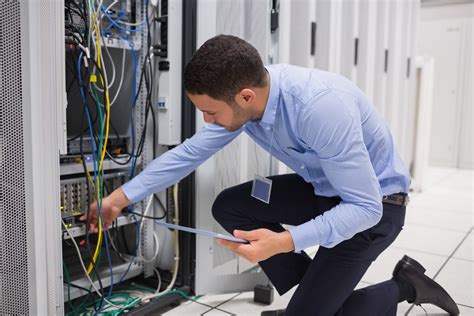
If you find yourself facing difficulty in getting your laptop to recognize your connected wired headphones, it may be prudent to seek assistance from technical support or a professional technician.
When encountering issues with headphone detection, it is advisable to consult experts who possess the knowledge and experience in troubleshooting such problems. Technical support personnel are readily available to provide guidance and assistance, either online or over the phone. By contacting them, you can explore various potential solutions, receive step-by-step instructions, and gain insights into possible causes that may have led to the issue.
Another option worth considering is seeking the assistance of a professional technician. These individuals specialize in diagnosing and solving hardware-related problems. Their expertise extends beyond mere headphone detection issues, as they can also assess the overall functionality of your laptop's audio ports and make necessary repairs or replacements if needed.
Remember that attempting to resolve the problem without proper knowledge or experience might exacerbate the issue or cause additional damage to your laptop. Relying on technical support or a trusted technician ensures that you receive accurate guidance from professionals who understand the intricacies of laptop audio systems.
In conclusion, when confronted with the frustrating situation of your laptop failing to detect wired headphones, it is best to seek help from technical support or a professional technician. Their expertise and guidance will assist you in resolving the issue efficiently and effectively, allowing you to enjoy your audio experience once again.
FAQ
Why is my laptop not detecting my wired headphones?
There could be several reasons why your laptop is not detecting your wired headphones. Firstly, check if the headphone jack is properly connected to your laptop. Sometimes, loose connections can prevent the detection. Secondly, make sure that your headphones are not faulty, try using them with another device. Additionally, check if the headphone jack is clean and free from any debris or dust. If none of these solutions work, it might be a driver issue. Updating or reinstalling the audio driver on your laptop may help to resolve the problem.
My laptop used to detect my wired headphones, but suddenly stopped. What should I do?
If your laptop suddenly stopped detecting your wired headphones, there are a few steps you can take to fix the problem. First, try restarting your laptop. Sometimes, a simple restart can resolve the issue. If that doesn't work, check if there are any software updates available for your laptop's operating system. Installing the latest updates may help to resolve any compatibility issues. Another possible solution is to try using a different pair of headphones to see if the problem lies with your original pair. If none of these steps work, it may be worth consulting a technician for further assistance.
My laptop detects my wired headphones, but no sound is coming through. What could be the problem?
If your laptop detects your wired headphones, but no sound is coming through, there are a few potential causes for this issue. First, check the volume levels both on your laptop and on the headphone controls (if applicable). It's possible that the volume is set too low or muted. Also, ensure that the headphone jack is fully inserted into the laptop's audio port. Additionally, check the audio settings on your laptop to make sure the correct output device is selected. If none of these solutions work, there may be an issue with the audio driver. Try updating or reinstalling the driver to see if that resolves the problem.
I've tried everything, but my laptop still can't detect my wired headphones. What else can I do?
If you have exhausted all the possible solutions and your laptop still cannot detect your wired headphones, there are a few other options you can consider. First, try using a USB headphone adapter. This will allow you to connect your headphones to a USB port instead of the audio jack, bypassing any issues with the headphone jack itself. Another option is to use wireless headphones or Bluetooth speakers instead, if your laptop supports these connectivity options. Lastly, if none of these suggestions work, it may be necessary to bring your laptop to a professional technician for further diagnosis and repair.

